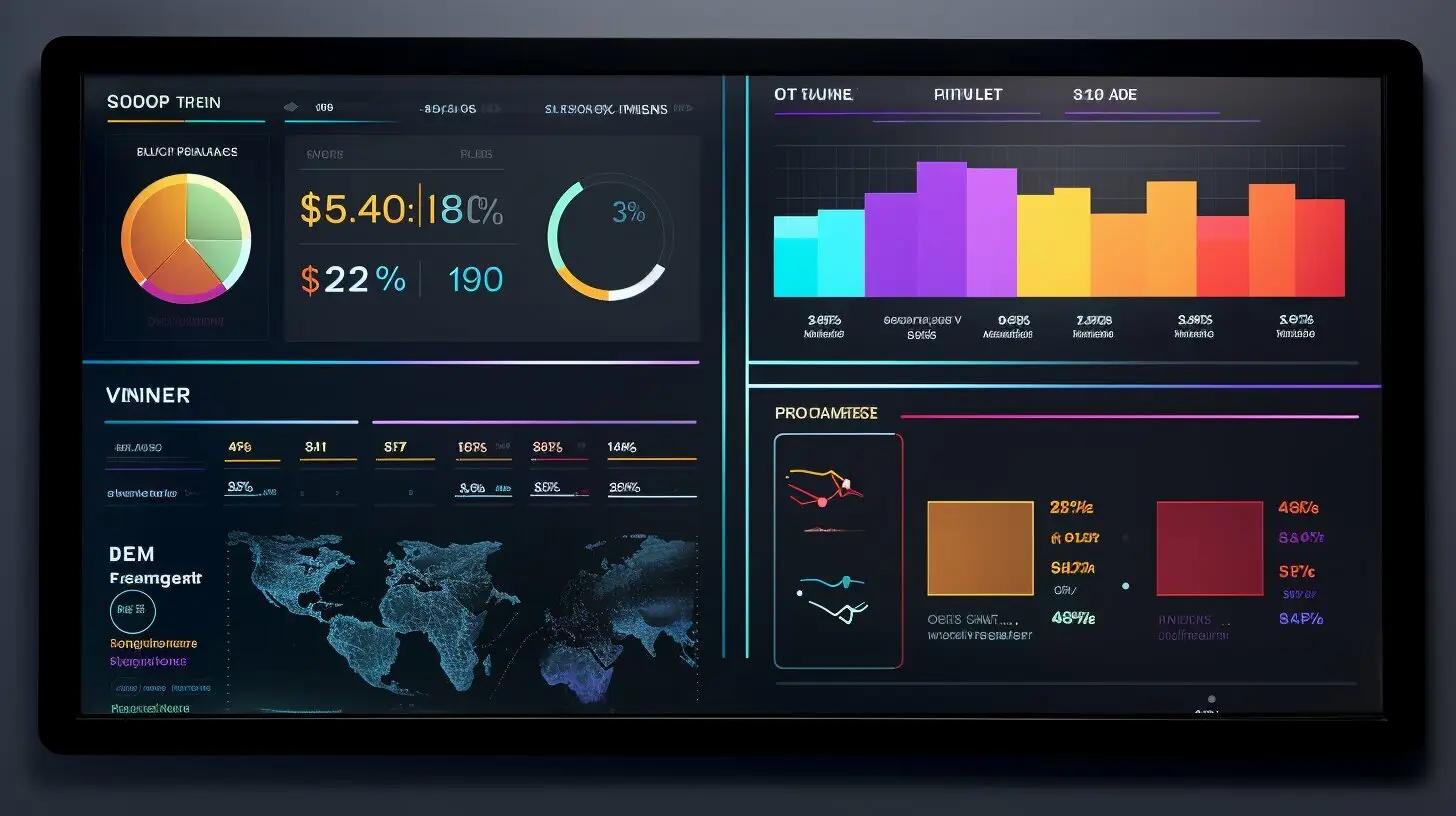As an automotive dealer, it can be a challenge to stay on top of sales performance and monitor your team’s progress. That’s where a dealer solutions dashboard comes in.
A dealer solutions dashboard is a powerful tool that allows you to track and monitor your dealership’s sales performance in real-time. With this dashboard, you can easily access key metrics such as sales revenue, lead conversion rates, and inventory levels. This information can help you make informed decisions and optimize your sales strategies for greater success.
Using a dealer solutions dashboard can provide numerous benefits for your dealership including improved efficiency, increased sales, and better overall performance. With this tool, you will have the ability to:
- Track and analyze key metrics
- Identify areas for improvement
- Make data-driven decisions
- Streamline operations
Key Takeaways:
- A dealer solutions dashboard is a powerful tool that allows you to track and monitor your dealership’s sales performance in real-time.
- Using a dealer solutions dashboard can improve efficiency, increase sales, and enhance overall performance.
- With a dealer solutions dashboard, you can easily access key metrics, identify areas for improvement, and make data-driven decisions.
Boost Sales with an Automotive Dealer Dashboard
As an automotive dealership, staying on top of sales performance is crucial to success. That’s where an automotive dealer dashboard comes in. This tool can help boost sales by providing real-time insights and analytics that allow your team to make data-driven decisions.
With a dealer dashboard, you can monitor key metrics such as sales volume, lead sources, and conversion rates. This allows you to identify areas that require improvement and adjust your strategy accordingly. The ability to view and analyze data in real-time means that you can make changes quickly, without waiting for end-of-month reports.
| Benefits of an Automotive Dealer Dashboard: |
|---|
| Real-time insights for sales performance |
| Data-driven decision making |
| Monitor and adjust strategy in real-time |
| Identify areas for improvement |
An automotive dealer dashboard typically includes a variety of features and functionalities that contribute to improving sales effectiveness. These may include:
- Lead tracking and management
- Sales performance tracking
- Customer relationship management (CRM) integration
- Inventory management
- Marketing automation
With these tools at your disposal, you can streamline your sales processes and provide a better experience for your customers. By utilizing an automotive dealer dashboard, you’ll not only increase sales, but also improve overall efficiency.
Check out the image below to see an example of an automotive dealer dashboard in action.

“Real-time insights and data-driven decision making are key to improving sales effectiveness and boosting overall dealership performance.”
Streamline Operations with a Dealer Management System
In today’s competitive automotive dealership industry, the ability to streamline operations and improve efficiency is key to achieving success. A dealer management system (DMS) can help achieve these goals by centralizing and automating key tasks and processes.
A robust DMS should include features such as inventory management, accounting capabilities, and customer relationship management (CRM) tools. These features can help dealerships manage their inventory levels, track sales performance, and maintain strong relationships with their customers.
| Key Features of a Dealer Management System: |
|---|
| Centralized database for customer and vehicle information |
| Inventory management and tracking |
| Sales and finance management |
| Service and parts management |
| Integration with third-party software such as accounting software and marketing automation platforms |
By utilizing a DMS, dealerships can improve their operational efficiency and reduce the risk of errors or oversights. For example, inventory management tools can help dealerships avoid overstocking or understocking their inventory, which can lead to lost sales or excess inventory holding costs.
Additionally, a DMS can help dealerships provide a better customer experience by providing quick and easy access to customer information, purchase history, and service records. This can help dealerships personalize their interactions with customers, leading to increased customer satisfaction and loyalty.

Overall, a dealer management system is an essential tool for automotive dealerships looking to optimize their operations and improve their bottom line. By centralizing and automating key tasks and processes, dealerships can reduce the risk of errors, improve their customer service, and ultimately drive greater sales success.
Dealer Software Solutions for Enhanced Performance
Dealerships today have a plethora of software solutions at their disposal to optimize their operations and drive sales success. Leveraging the right tools can not only enhance efficiency and productivity, but also improve customer experience and boost revenue. Below are some of the essential software solutions dealerships should consider:
Customer Relationship Management (CRM) Systems
A CRM system is a powerful tool for managing customer interactions and information. It allows dealerships to track the entire customer journey, from initial contact to post-sale follow-up. With a comprehensive view of customer data, dealerships can personalize their interactions and provide more targeted marketing efforts to increase conversions. CRM systems can also help identify trends and provide insights into customer behavior and preferences.
Inventory Management Software
Managing inventory can be a daunting task for dealerships, but inventory management software can simplify the process. It enables dealerships to track inventory levels, automate replenishment, and streamline ordering and receiving processes. With real-time inventory data, dealerships can make informed decisions on pricing and promotions and reduce the risk of overstocking or stockouts.
| Benefits of Inventory Management Software | Features of Inventory Management Software |
|---|---|
|
|
Marketing Automation Platforms
Marketing automation platforms enable dealerships to streamline their marketing efforts, automate repetitive tasks, and improve lead generation and nurturing. With features such as email and social media marketing, lead tracking and scoring, and analytics and reporting, dealerships can create targeted campaigns that resonate with their audience and drive conversions.

Summary
By utilizing a combination of these software solutions, dealerships can enhance their performance and stay ahead of the competition. Customer relationship management systems enable dealerships to manage customer interactions and information, while inventory management software simplifies the process of managing inventory. Marketing automation platforms streamline marketing efforts and improve lead generation and nurturing. Together, these solutions can provide dealerships with the tools they need to optimize their operations and drive sales success.
Leveraging Data Insights with a Dealer Analytics Platform
In today’s data-driven world, automotive dealerships must rely on data insights to make informed decisions and drive sales success. This is where a dealer analytics platform comes in, offering valuable insights into dealership performance and customer behavior.
A dealer analytics platform brings together data from various sources, such as CRM systems, inventory management tools, and sales tracking software, to provide a comprehensive view of dealership operations. By leveraging this data, dealerships can gain insights into customer behavior, identify trends and patterns, and make data-driven decisions to optimize their performance.
Key Metrics and Indicators
There are several key metrics and indicators that dealers should track and analyze to improve sales performance. These include:
- Lead conversion rates
- Sales effectiveness
- Inventory turn
- Customer retention rates
By tracking these metrics and analyzing the data, dealerships can identify areas for improvement, such as optimizing their sales process or refining their marketing strategies. They can also identify top-performing salespeople and replicate their successes throughout the organization.
However, simply collecting data is not enough. Dealerships must also be able to effectively analyze and interpret the data to gain insights and drive results.
The Role of Predictive Analytics
Predictive analytics is a key component of a dealer analytics platform, enabling dealerships to forecast customer behavior, identify potential sales opportunities, and make data-driven decisions. By analyzing historical data and identifying patterns, predictive analytics can help dealerships anticipate customer needs and tailor their marketing and sales strategies accordingly.
Predictive analytics can also help dealerships identify potential risks and take proactive measures to mitigate them. For example, by analyzing data on customer churn, dealerships can identify at-risk customers and take steps to retain their business.
Image Alt Tag: Leveraging Data Insights with a Dealer Analytics Platform

Empowering Dealership Management with Performance Dashboards
Performance dashboards are essential tools for dealership management, providing real-time insights into the performance of sales teams and the dealership as a whole. By leveraging data analytics and visualization, these dashboards empower managers to make informed decisions that drive sales success.
When designing a performance dashboard, it’s important to include key metrics and KPIs that provide a comprehensive view of dealership performance. These might include metrics like gross profit, inventory turn, and lead conversion rates, as well as KPIs like average time-to-sale and customer satisfaction ratings.
One of the primary benefits of a performance dashboard is the ability to identify trends and opportunities for improvement. For example, if lead conversion rates are consistently low, a dashboard can help pinpoint where in the sales process improvements need to be made. Similarly, if inventory turn is slow, a dashboard can identify which vehicles are languishing on the lot and in need of promotions or discounts.
Effective performance dashboards should also be customizable, allowing managers to adjust metrics and KPIs as needed to track progress against specific goals or initiatives. This flexibility ensures that the dashboard remains a useful tool for improving dealership performance over time.
Key Benefits of a Performance Dashboard:
- Real-time insights: Monitor sales performance and make data-driven decisions
- Identify trends and opportunities: Pinpoint areas for improvement and optimize sales success
- Customizable metrics: Adjust the dashboard to track progress against specific goals and initiatives
By leveraging a performance dashboard, dealership management can stay on top of sales performance and take proactive steps to optimize success. The dashboard serves as a central hub for sales data, providing a comprehensive view of the performance of individual sales reps, sales teams, and the dealership as a whole.

Essential Tools for Dealership Management
Effective dealership management requires the use of various tools and technologies to streamline operations and increase efficiency. By utilizing the right tools, dealerships can optimize their performance, reduce costs, and enhance customer satisfaction. Here are some of the essential tools that automotive dealerships should consider implementing:
| Tool | Description |
|---|---|
| Inventory Management Tools | Inventory management tools are software solutions that help dealerships manage their vehicle inventory. These tools provide real-time tracking of inventory levels, automate reordering, and optimize vehicle pricing for maximum profitability. |
| CRM Systems | Customer Relationship Management (CRM) systems are software solutions that help dealerships manage their customer interactions and data. These systems provide a centralized database of customer information, automate marketing and sales workflows, and enable personalized customer communication. |
| Sales Tracking Software | Sales tracking software is a tool that helps dealerships track and monitor their sales performance. These tools provide real-time insights into metrics such as lead generation, conversion rates, and sales rep performance, enabling managers to make data-driven decisions. |
In addition to these tools, dealerships can also benefit from using marketing automation platforms, digital sales tools, and online scheduling software. By leveraging these tools effectively, dealerships can stay ahead of the competition and achieve greater success in the automotive industry.

Essential Tools for Dealership Management
Effective dealership management requires access to the right tools and technologies. From inventory management software to customer relationship management (CRM) systems, these tools can streamline operations and improve efficiency for automotive dealerships of any size.
Here, we’ll explore some of the essential tools for dealership management and how they can impact overall dealership performance.
| Tool | Description | Benefits |
|---|---|---|
| Inventory Management Software | Inventory management software allows dealerships to track and manage vehicle inventory in real-time. This provides dealers with visibility into stock levels, pricing, and availability. | – Prevents overstocking or understocking – Saves time by automating inventory management – Optimizes pricing and vehicle distribution |
| Customer Relationship Management (CRM) Systems | A CRM system helps dealerships manage customer interactions and sales leads. It enables dealers to track customer data, create marketing campaigns, and manage customer service requests. | – Improves customer retention – Increases customer satisfaction – Streamlines sales and marketing processes |
| Sales Tracking Software | Sales tracking software allows dealerships to monitor sales performance in real time. It provides insights into lead generation, customer behavior, and sales trends. | – Improves sales performance – Enables dealers to identify opportunities for growth – Helps dealers to optimize sales processes |
By utilizing these essential tools and technologies, dealerships can improve their overall performance and drive sales success. Incorporating these tools into daily operations can lead to increased efficiency, automation, and accuracy, allowing dealers to focus on delivering the best possible customer experience.

Optimizing Performance through Dealership Data Analysis
One of the most critical aspects of optimizing dealership performance is data analysis. By collecting and analyzing data, dealerships can uncover valuable insights into sales performance and identify areas for improvement. The process of data analysis can be complex, requiring specialized skills and tools.
To begin the data analysis process, dealerships must first collect and cleanse their data. This involves pulling data from various sources into a single location and removing any errors or duplicates. Once the data has been cleaned, dealerships can begin analyzing it using data visualization and predictive analytics tools. These tools allow dealerships to identify patterns and trends in their data, as well as make predictions about future sales performance.
Data analysis is not a one-time process but rather an ongoing effort. Dealerships should regularly generate and analyze reports to track their progress and make informed decisions. Common reports include sales reports, inventory reports, and customer engagement reports.
The impact of data analysis on dealership performance can be significant. By leveraging data insights, dealerships can identify the most effective sales strategies, optimize their inventory management, and improve customer engagement. Data analysis can help dealerships stay ahead of the competition by identifying emerging trends in the automotive industry.
Benefits of Data Analysis for Dealerships
Data analysis can provide numerous benefits for dealerships, including:
- Identifying the most effective sales strategies
- Optimizing inventory management
- Improving customer engagement and satisfaction
- Staying ahead of the competition
Data analysis is a critical component of optimizing dealership performance. By collecting and analyzing data, dealerships can gain valuable insights into their sales performance and make informed decisions about their operations.

The Importance of a Dealer Solutions Dashboard
As discussed throughout this article, a dealer solutions dashboard is a crucial tool for tracking and monitoring sales performance in the automotive industry. By providing real-time insights and analytics, a dashboard can help dealerships optimize their sales success, streamline operations, and enhance their overall performance.
With a dealer solutions dashboard, dealerships can track a range of key metrics and KPIs, including sales figures, inventory levels, customer data, and marketing campaigns. This data can be used to identify trends, opportunities, and areas of improvement, enabling dealers to make informed decisions and drive sales growth.
A dealer solutions dashboard can help dealerships stay ahead of the competition by providing a comprehensive view of their operations and performance. By utilizing the latest software solutions, such as CRM systems, inventory management software, and marketing automation platforms, dealerships can gain a competitive edge and achieve long-term success.

Ultimately, the importance of a dealer solutions dashboard cannot be overstated. Whether you are a small independent dealership or a large national chain, a dashboard can help you optimize your operations and achieve your sales goals.
The Importance of a Dealer Solutions Dashboard
Throughout this article, we’ve explored the various ways in which dealer solutions dashboards can help automotive dealerships optimize their sales performance. By tracking and monitoring key metrics and KPIs, dealers can gain valuable insights into their operations and make informed decisions to enhance their effectiveness.
A dealer solutions dashboard provides real-time insights and analytics to improve sales performance and streamline operations. Through the use of an automotive dealer dashboard, dealers can effectively boost sales and enhance their dealership management.
By leveraging data insights with a dealer analytics platform, dealers can unlock valuable insights into their sales performance. Using essential tools such as inventory management, CRM systems, and sales tracking software can help dealerships maximize their potential and drive sales success.
The key to optimizing dealership performance lies in effective data analysis and reporting. By generating and analyzing regular reports and utilizing data analysis techniques, dealerships can identify trends, opportunities, and areas of improvement to drive their sales success.
The value of a dealer solutions dashboard cannot be overstated in today’s competitive automotive dealership industry. By integrating these tools into their operations, dealerships can achieve greater success and maximize their potential for growth and profitability.
FAQ
Q: What is a dealer solutions dashboard?
A: A dealer solutions dashboard is a software tool that allows automotive dealerships to track and monitor their sales performance. It provides real-time insights and analytics to help dealerships optimize their sales success.
Q: Why is tracking and monitoring sales performance important for automotive dealerships?
A: Tracking and monitoring sales performance is important for automotive dealerships because it allows them to identify strengths and weaknesses in their sales strategies. By analyzing data and metrics, dealerships can make informed decisions to improve their overall sales performance.
Q: How can an automotive dealer dashboard boost sales?
A: An automotive dealer dashboard can boost sales by providing real-time insights and analytics. It allows dealerships to track key metrics, identify trends, and make data-driven decisions to optimize their sales strategies.
Q: What features and functionalities does a dealer dashboard have?
A: A dealer dashboard typically includes features such as data visualization, sales tracking, inventory management, and customer relationship management (CRM) tools. These functionalities help dealerships streamline their operations and improve sales effectiveness.
Q: What is a dealer management system?
A: A dealer management system is a software tool that helps streamline operations within a dealership. It includes features such as inventory management, sales tracking, and customer relationship management to improve efficiency and overall dealership performance.
Q: What are some essential dealer management tools for automotive dealerships?
A: Essential dealer management tools for automotive dealerships include inventory management software, CRM systems, and sales tracking software. These tools help dealerships manage their inventory, track customer interactions, and analyze sales performance.
Q: How can a dealer analytics platform provide valuable insights?
A: A dealer analytics platform can provide valuable insights by analyzing key metrics and indicators. It helps dealerships track sales performance, identify trends, and make data-driven decisions to improve overall sales effectiveness.
Q: What reports should be generated and analyzed regularly for automotive dealerships?
A: Automotive dealerships should generate and analyze reports such as sales reports, inventory reports, customer engagement reports, and financial reports. These reports provide valuable insights into sales performance and help identify areas for improvement.
Q: What is the role of data analysis in optimizing dealership performance?
A: Data analysis plays a crucial role in optimizing dealership performance. By collecting and analyzing data, dealerships can identify trends, predict customer behavior, and make informed decisions to drive sales success.
Q: Why is a dealer solutions dashboard important for automotive dealerships?
A: A dealer solutions dashboard is important for automotive dealerships because it allows them to track and monitor sales performance in real time. It provides valuable insights and analytics to help dealerships optimize their strategies and achieve greater success.






